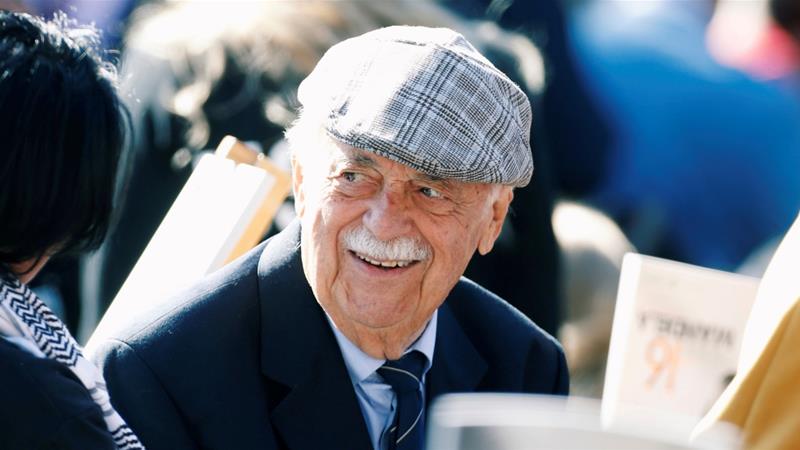George Bizos, an anti-apartheid icon and renowned human rights lawyer who helped defend Nelson Mandela on treason charges for which he escaped the death penalty, has died aged 92.
President Cyril Ramaphosa announced rights lawyer’s passing on Wednesday during a media conference. “I have just received news that legal eagle of our country George Bizos has passed away,” Ramaphosa said. “This is very sad for our country.”
There was no immediate word on the cause of death, or whether Bizos had been ill.
Bizos represented Mandela during the Rivonia trial ,which saw Mandela and seven others sentenced to life imprisonment in 1964 on charges of seeking to overthrow the racist apartheid government. Many had expected the death penalty.
Ramaphosa described Bizos as one of the lawyers who “contributed immensely to the attainment of our democracy”.
“He had an incisive legal mind and was one of the architects of our constitution,” the president during an online media briefing.
Bizos arrived in South Africa as a 13-year-old war refugee from Greece and became one of its most respected lawyers.
In a long career dedicated to defending democratic values and human rights, the soft-spoken Bizos represented a series of activists against the white minority regime and later helped to finalise the constitution of post-apartheid South Africa.
A beloved national figure, he continued working into his late 80s. One of his last major trials secured government payouts in 2014 for families of 34 miners shot dead by police at Marikana north-west of Johannesburg.
Bizos was in his mid-30s when he was chosen in 1963 to join a team of advocates that represented Mandela and other leading activists in one of the most important political trials in the history of South Africa.
Although a junior member of the defence team, Bizos was credited with the tactic of proposing that Mandela deliver a statement from the dock to present the group’s cause, rather than submit him to cross-examination.
The speech was electrifying, notably Mandela’s often-cited lines on his hope for democracy: “It is an ideal which I hope to live for and to achieve. But if needs be, it is an ideal for which I am prepared to die.”
Bizos would say later that he advised Mandela to avoid challenging the court over the possibility of a death sentence by adding the tempering words “if needs be”.
In his 1994 autobiography Long Walk to Freedom, Mandela described the advocate as a lifelong friend and “a man who combined a sympathetic nature with an incisive mind”.
Bizos continued to represent Mandela throughout his 27-year jail term and also acted for his then wife, Winnie Madikizela-Mandela, on more than 20 occasions.
Among his other high-profile work, Bizos defended the family of Black Consciousness Movement leader Steve Biko, who died in 1977 in police detention, and communist leader Chris Hani, who was assassinated in 1993.
He was later involved in the Truth and Reconciliation Commission set up to investigate apartheid-era political crimes.
In 2004 he represented the now late leader of Zimbabwe’s main opposition party, the Movement for Democratic Change’s Morgan Tsvangirai on a charge of plotting to kill then president Robert Mugabe, for which he was acquitted.
“However oppressive a regime might be, the court is the last forum in which an oppressed person has an opportunity to speak out,” Bizos said in a television interview at the time.



I am extremely impressed with your writing skills and also with the layout on your blog. Is this a paid theme or did you customize it yourself? Either way keep up the nice quality writing, it’s rare to see a nice blog like this one nowadays.